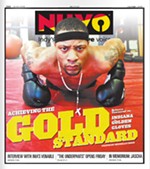Media Complicity and Cowardice
Buying the War
9 p.m. Wednesday
PBS
You already know the basics of Bill Moyers' Buying the War: The Bush Administration beat the drum to convince Americans that attacking Iraq was necessary and, with a lapdog media acting as enablers, got what it wanted.
But what Moyers does so effectively in these 90 minutes is compile the most egregious examples of media complicity and cowardice. Seeing it in one place is devastating.
Moyers also points out something you probably didn't know -- some good, thorough reporting took place in the run up to war, and some politicians spoke out, but it was either ignored, buried or drowned out because much of the media feared being seen as unpatriotic.
Instead, newspapers and TV news ate up the faulty intelligence and outright lies ("We know they have weapons of mass destruction," Defense Secretary Donald Rumsfeld said on Sept. 26, 2002 -- and others echoed) and relied on the word of official sources. Perhaps the most depressing instance of the media's collective failure were the editorials that supported Secretary of State Colin Powell's Feb. 5, 2003, testimony before the United Nations Security Council, when he made what many newspaper editorial writers called "an ironclad case" for war.
Some reporters and commentators remained skeptical. Associated Press reporter Charles Hanley, though, said his editors balked every time he wrote that despite the administration's claims, no weapons of mass destruction had been found in Iraq. Phil Donahue said MSNBC told him he couldn't have a liberal on his show unless he had two conservatives.
Warren Strobel and Jonathan Landay, who worked for the Washington bureau of Knight Ridder newspapers, questioned the administration's claims from the beginning. They didn't believe Saddam Hussein would put a biological weapons facility under his home, as The New York Times reported. They reported that Hussein wasn't after nuclear weapons, while The Times was running headlines like "Hussein intensifies quest for A-bomb parts."
Why didn't anyone listen? Because The Times is the nation's paper of record and Knight Ridder didn't have a newspaper in New York or Washington. In fact, some Knight Ridder newspapers didn't even run their reporters' stories.
I don't want to play conspiracy theorist here, but consider something that goes unsaid in Buying the War: Knight Ridder did the best reporting; Knight Ridder no longer exists. Donahue questioned the war; Donahue's show was canceled. Today, the media, particularly newspapers, are retrenching. We're getting more "citizen journalists," commentators and he-said, she-said stories and fewer reporters vetting the truth.
You think the powers that be are sad about this? If you do, I've got a war to sell you.






